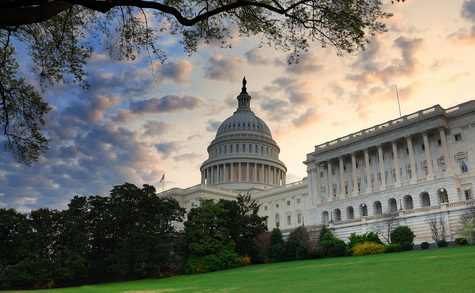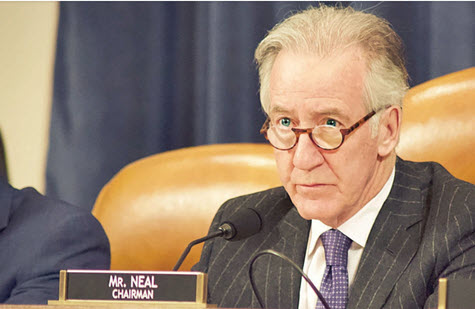
Congress passed a multi-trillion “omnibus” bill Dec. 21 that provides approximately $900 billion in coronavirus relief, as well as $1.4 trillion to fund government operations through Sept. 30. (Text of the 5,550-plus page bill )
- The legislation is the culmination of months of bipartisan negotiations to further stimulate the COVID-era economy. It will also keep the federal government operational for the rest of the current fiscal year. The Senate approved the legislation on a 92-6 vote, and the House on a 359-53 vote.
- “The size of the deal approximates the 2009 stimulus act that Congress passed at the beginning of the Obama administration – and sits on top of the much larger stimulus bill” known as the CARES Act, the $2.2 trillion legislation that President Trump signed last spring. (New York Times editorial (Dec. 20). See also Roundtable Weekly, March 27)
- “The COVID-19 relief package is welcome news to help America’s families, businesses, and communities cope with the pandemic in the midst of the holiday season,” said Roundtable President and CEO Jeffrey D. DeBoer. “With vaccinations underway, this bipartisan package provides hope for a robust economic recovery in 2021 – and is a bridge for the real estate industry to work with President-elect Biden and Vice President-elect Harris on additional measures to push health and economic solutions forward.”
- A broad coalition of national real estate organizations endorsed many of the components included in the emergency COVID measure, through a Dec. 16 letter and supporting policy memo sent to the Biden-Harris transition team. (Roundtable Weekly, Dec. 18) These include direct assistance to families and workers in the form of “stimulus checks” and expanded unemployment benefits; funding for states to distribute coronavirus vaccines; a new round of Paycheck Protection Program (PPP) loans for qualifying small businesses; and an emergency assistance fund to help households that have suffered economic hardship during the pandemic meet their monthly rent and utility bill obligations.
- “While there remains much work to do in the coming weeks and months, this effort is clearly a step in the right direction and will come as welcome news for so many households facing financial distress,” said National Multifamily Housing Council President Doug Bibby, and National Apartment Association President and CEO Bob Pinnegar, in a joint statement. “We are heartened that the legislation includes such critical resources that will allow those impacted by COVID and resulting economic stress to meet their financial obligations, including rent.”
Summaries provided by various Congressional offices regarding the $900 billion COVID-19 relief package include:
Matters of particular interest to the real estate sector are summarized below. Additionally, a Roundtable summary PDF can be downloaded.
Direct relief to families, individuals, and the unemployed: $286 billion
- “Stimulus checks”: $166 billion
- $600 per individual earning up to $75K per year ($1200 under CARES Act)
- $1200 per couple earning up to $150K per year
- $600 for each dependent child
- For example, family of four receives $2400 assistance
- Additional Unemployment Benefits: $120 billion
- $300 boost in weekly unemployment insurance to supplement existing state and federal unemployment benefits (CARES Act provided $600/week boost)
- From December 26, 2020 until March 14, 2021
- Available to “gig” workers and the self-employed
Paycheck Protection Program (PPP) “Round 2”: $284.5 billion
- Extends PPP through March 31, 2020
- Borrower eligibility more limited than CARES Act “Round 1.” Small business must have:
- 300 or fewer employees, and
- 25% revenue loss for any quarter in 2020 (compared to same quarter in 2019)
- 501(c)(6) organizations now eligible – but not lobbying organizations (501(c)(3)s)
- Loan amount is generally 2.5-times payroll (same as CARES Act) – with max loan amount of $2 million (CARES Act was $5 million)
- Loan amount formula is increased to 3.5-times payroll for qualifying small businesses in the restaurant and hospitality industries (NAICS Code 72)
- Round 2 borrower must have exhausted initial Round 1 PPP loan
- Expedited forgiveness for loans up to $150K
- “60/40 Rule” remains in effect. That is, no more than 40% of loan proceeds can be used for rent and other non-payroll items.
- Expanded “allowable uses” for Round 2 PPP loans.
- COVID-related expenses like PPE purchases, indoor air quality improvements, workplace protection measures
- Repair property damage from recent social unrest
- Costs associated with outdoor dining
- Round 1 allowable uses still apply: payroll, benefits, rent, mortgage, utilities
- “Passive real estate” remains ineligible for PPP loans. New law codifies SBA’s “ineligibility rule” at 13 CFR 120.110 for purposes of “passive real estate.”
- Codifies that “publicly traded companies” are prohibited from accessing PPP loans
- PPP and Tax Issues:
- Forgiven PPP loans are not treated as taxable income
- Business expenses paid with forgiven PPP loans are tax deductible (a reversal of Treasury guidance and retroactive to enactment of the CARES Act in March)
COVID Vaccine Distribution, Testing, Tracing: $69 Billion. Includes –
- $9 billion for CDC and states to distribute vaccines
- $22 billion directly to states for testing, tracing, and “COVID mitigation”
Transportation Assistance: $45 billion. Includes –
- $15 billion: Airline workers
- $14 billion: Mass transit agencies
- $10 billion: State highway agencies
- $2 billion: Airports and airport concessionaires
- $1 billion: Amtrak
Residential Rent Assistance, Eviction Moratorium: $25 billion
- CDC’s current federal eviction moratorium extended one month (through Jan 31, 2021)
- Funds available through December 31, 2021
- Covers household rent past due, coming due, and utility bills
- Assistance not to exceed 12 months of payments, with a limit up to three months for prospective rent. Household can apply for additional assistance depending on availability of funds.
- States/localities receive “grants” from U.S. Treasury, apportioned based on Social Security formula.
- Households apply to state/local for assistance. Landlords can help household apply.
- Assistance paid directly to landlord.
- Households at 50% AMI are “prioritized” for assistance; no household over 80% AMI can receive assistance.
- Renter must have experienced “financial hardship” due to COVID, or is “at risk” of homelessness.
- State/local grantee only considers the household’s monthly income at the time the household applies for assistance, or total income for calendar year 2020.
- State/local grantee “shall ensure” “to the extent feasible” that any emergency rental assistance here does not duplicate other Federal rent assistance (e.g., Section 8)
- Emergency rental assistance is not income for tax purposes.
- No provisions regarding allowable forbearance on mortgage payments by property owner (as in CARES Act).
Shuttered Theaters and Live Venues: $15 billion
- Small Business Administration grants available to eligible live venues, independent movie theaters, museums
- Maximum grant amount is $10 million
Unwinding the Federal Reserve’s Emergency Lending Facilities
- Winds down the 13(3) emergency lending facilities created under the CARES Act (the Main Street Lending Program for mid-size businesses, and three other facilities aimed to boost purchases of municipal and corporate bonds)
- These 13(3) program cannot be re-opened or duplicated in the future by the Fed without Congressional authorization
- $429 billion in unspent CARES Act funds intended for Fed facilities repurposed to offset the overall $900B package
- Fed retains more flexibility over the Term Asset-Backed Securities Loan Facility (TALF), initially launched during the 08-09 financial crisis to jumpstart the economy and increase banks’ liquidity. TALF supports the issuance of CMBS and other asset-backed debt securities. This bill closes TALF, but the Fed can re-start this facility in the future as emergency economic conditions may arise.
- More details on the cessation of the CARES Act 13(3) programs as reported in The Hill (Dec. 20).
Real Estate-Related Tax Relief and Tax Extenders
- Reduces the cost recovery period for residential rental property placed in service before 2018 to 30 years under the alternative depreciation system (relevant to owners of multifamily housing who elect out of the new TCJA limits on the deductibility of business interest)
- Minimum 4% credit amount for low-income housing tax credit projects that involve the rehabilitation and renovation of affordable housing (in recent years, the 10-year credit for qualifying projects has fluctuated between 3.15% and 3.97%)
- Temporary reinstatement of the full 100% deduction for business meals expenses (food and beverages) in 2021 and 2022
- 6-month extension and expansion of the employee retention tax credit for businesses that retain their employees despite government-ordered shutdowns or steep declines in business revenue (>20%)
- Permanent extension of the enhanced deduction for energy-efficient commercial buildings (section 179D)
- 5 year extension of the new markets tax credit, tax incentives for Empowerment Zones, and the tax exclusion for mortgage debt forgiveness on a principal residence
- 2-year extension of the tax credit for residential solar property and other residential renewable energy improvements tax (section 25D)
- 1-year extension of the $2,000 tax credit new energy efficient homes (section 45L), the deductibility of mortgage insurance premiums, and the tax credit for energy efficient improvements (e.g., windows, insulation, roofing, doors) to owner-occupied homes (section 25C)
Troubled Debt Restructurings (TDRs)
- CARES Act’s TDR provisions extended until January 1, 2022. (ABA Banking Journal, Dec. 21)
- Extension provides an additional year of relief from accounting and disclosure requirements on loan modifications made in response to the COVID-19 pandemic.
- The Roundtable and other real estate groups recently requested an extension to the TDR relief period “to offer prudent relief to commercial real estate owners who have been acutely affected by the pandemic.” (Roundtable Weekly, Nov. 13)
What’s Not Included in the $900 billion package
- Liability protections for businesses, non-profits, schools, hospitals
- Federal aid to state and local governments for general revenue shortfalls (but aid for vaccine distribution provided as noted above)
Omnibus Appropriations Bill for FY 2021
- $1.4 trillion in federal spending through end of FY’2021 (Sept. 30, 2021)
- EB-5 Regional Center investment visa program extended until June 30, 2021 – with no legislative reforms at this time
The omnibus and its impact on The Roundtable’s 2021 policy agenda will be a focus of discussion during The Roundtable’s State of the Industry Meeting and Policy Advisory Committee Meetings Jan. 26-27 (all virtual).
# # #











